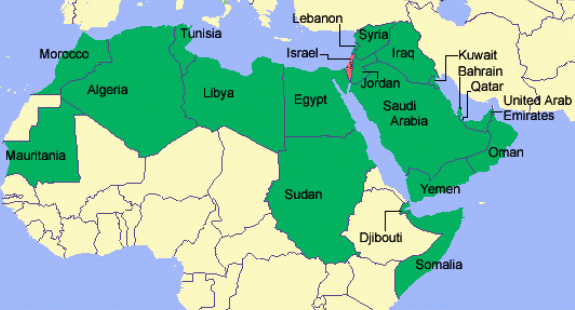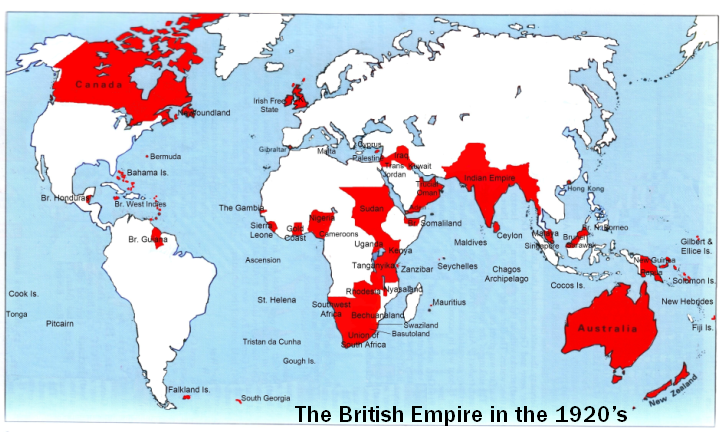Zionism as a Colonialist Project
From an article in Dissent (H-T: Bob):
"Yoav Peled, a professor of political science at Tel Aviv University, recounted the academic debate over whether Zionism should be viewed as a form of colonialism or national liberation. I was impressed at how well he argued his case for Zionism as colonialism, but shocked when in cross-discussion among the panelists he would not transcend his ideological box; tempers flared after he provocatively asserted that the 1967 Six Day War was not defensive on the part of Israel, because it had attacked Egypt first. While narrowly true, Peled ignored critical details that had prompted Israel’s attack: Egypt’s expulsion of UN peacekeepers, its aggressive deployment of a large army along the border, its blockade of Eilat, the mass hysteria of “patriotic” Egyptian mobs calling for war, and its new anti-Israel alliance with Jordan."
British Colonialist Empire:
French Colonialist Empire:
Belgian, German, Spanish, Italian, etc. Colonial Map in Africa:
Arab Colonial Map:
Ottoman Colonial Map:
Israel Colonial Map (Israel = red surrounded by green):
More, later
___________
Later (June 2):
"Yet Peled’s talking points are worth pondering. He noted that until the First World War, Jewish settlements were referred to as “colonies” (moshavot) and that the Bank Leumi (the “National Bank”) was initially called the “Jewish Colonial Trust.”
The author of the article seems to be impressed by the linguistic "proof" provided by Peled that the project of Zionism was indeed colonialist in essence because the first settlements were called "moshavot" a term translated as "colonies". This is hardly proof of anything but the ignorance of the author of the Hebrew language and the dishonesty of Peled's argument.
According to the English wikpedia:
In a moshava, as opposed to communal settlements like the kibbutz and the moshav, all the
land and property are privately-owned. The first moshavot, described as
"colonies" in professional literature, were established by pioneers
of the First
Aliyah in Ottoman Palestine.[1]
The economy of the early moshavot was based on agriculture.
Petah Tikva,
known as the "Mother of the Moshavot" (Em HaMoshavot),[2]
was founded in 1878, four years before the First Aliyah, by religious Jews from Jerusalem."And Wiki in Hebrew has a more detailed entry in which it explains the difference between moshava in its "colonial" sense and "Moshava" as a common and colloquial Hebrew term for a type of agricultural settlement:
קולוניה (או מושבה בעברית, אשר יש להבדיל בינה לבין "מושבה" ו"מושב" במשמעותן כצורת התיישבות ישראלית) היא חבל ארץ הנמצא תחת שליטת ישות מדינית המרוחקת ממנו גאוגרפית. במשמעותה המודרנית, קולוניה מתאפיינת על פי רוב בשליטת מדינה זרה על חבל הארץ כתוצאה מכיבוש, המלווה ביישוב מתיישבים מארץ האם תוך קיפוח זכויותיהם של ילידיו המקוריים. המונח קולוניה קשור קשר הדוק למונחים קולוניאליזם ואימפריאליזם.
Colony (or "Moshava in Hebrew, to be distinguished from the terms "moshava" and "moshav" whose meanings designate different types of Israeli settlement) is a region controlled by a political entity which is geographically far removed from it. In its modern meaning, a colony is characterized mostly by the domination of a foreign country over a region as result of conquest, accompanied by the settlement of citizens of the mother country while disenfranchising the indigenous inhabitants. The term "colony" in this meaning is tightly connected to the terms "colonialism" and "Imperialism".
The ultimate proof of Peled's either ignorance of Hebrew history, or deliberate tempering with the Hebrew terminology to fit snugly into his ideological theories can be found in the fact that the first Moshava, Petach-Tiqva, was established by religious Jews from Jerusalem, while Palestine was still a part of the Ottoman empire, on swamp land that had been purchased legally by the would be settlers. I was born in Petach-Tiqva and can still remember how my grandmother, who had lived there since 1942, would say she was going to the moshava to do some shopping, meaning she was going what could roughly be compared to today's "downtown". The small wooden shack where she lived with her family was just a few streets away from the main street of the "moshava".
BTW, the term "moshava" is also used in Biology within the phrase "Moshavat Haidakim", meaning a bacterial colony defined as a visible cluster of bacteria growing on the surface of or within a solid medium, presumably cultured from a single cell.
Read the following carefully; there is something there about refugees that very few remember today
"Originally intending to establish a new settlement in the Achor Valley, near Jericho, the pioneers purchased land in that area. However, Abdülhamid II cancelled the purchase and forbade them from settling there, but they retained the name Petah Tikva as a symbol of their aspirations.
Undaunted, the settlers purchased a modest area (3.40 square kilometers) from the village of Mulabbis (variants: Mlabbes, Um-Labbes), near the source of the Yarkon River. The Sultan allowed the enterprise to proceed, but because their purchase was located in what was a malarial swamp, they had to evacuate when the malaria spread, founding the town of Yehud near the Arabic village Yehudiyya about 20 kilometres (12 mi) to the south.[citation needed] With the financial help of Baron Edmond de Rothschild they were able to drain the swamps sufficiently to be able to move back in 1883, joined by immigrants of the First Aliyah, and later the Second Aliyah.
During the Sinai and Palestine Campaign of World War I, Petah Tikva served as a refugee town for residents of Tel Aviv and Jaffa, following their exile by the Ottoman authorities due to their refusal to serve the Ottoman army to fight the invading British forces. The town suffered heavily as it lay between the Ottoman and British fronts during the war."








2 Comments:
Again the classic trope about Zionism being equal to colonialism/imperialism/racism/anything-very-bad-ism.
How can a people without a country, who returned to their ancestral homeland, most of them as refugees from European and Arab countries, be considered colonizers in their own land?
The truth is that Zionism is a unique phenomenon in history that does not fit any ready-made rubrics, and this baffles many historians. Trying to make it a colonialist project is trying to fit a round peg in a square hole.
"Yoav Peled, a professor of political science at Tel Aviv University, recounted the academic debate over whether Zionism should be viewed as a form of colonialism or national liberation...
Peled likewise rejected Zionist arguments that Palestine’s economy was developed by the Jews rather than exploited on behalf of an overseas colonial power, and that until resisting Arab attacks in the 1948 war, land was purchased rather than conquered; he pointed out that land was bought from absentee Arab landlords, forcing the removal of thousands of Arab tenant farmers and their families. He further argued that the development of a separate Zionist economic infrastructure, with advanced cultivation and production techniques, made it impossible for native Palestinians to compete.
By way of contrast, Ronald Radosh, a former leftist currently associated with the conservative Hudson Institute, described the near-universal left-wing support for Israel at its birth in 1948..."
Somewhat minor point that leads into something more significant:
The author mentions that Peled is a political scientist but leaves out that Radosh is a historian. These are different approaches with different emphases. In particular, historians should recognize that it is a mistake to force contemporary social norms (or your own personal politics) on the past.
Absentee landlords were a common form of land tenure during the Ottoman Empire. After WWI, absentee Arab landlords took over a preexisting framework. They were the owners. My point is rather than condemning this as some sort of abnormal practice, recognize it was the norm.
Setting aside history, one thing that always makes me skeptical of people who bring up this line of argument is: who else were the early Zionists supposed to purchase the property from? Is property ownership in general a bad thing? Or just "absentee" ownership?
The next point Peled makes is strange. Are we supposed to feel bad that Zionists were more efficient in their use of land and resources, better technology, to say nothing of their intelligence and skill? I hate to sound like some loony right-winger, but what is up with the hatred of success?
Which brings me to Radosh. Much of the left supported Israel prior to 1967 because Israelis were actively applying socialist principles in a part of the world that was dominated by monarchies and military rulers. The government and institutions of power were controlled by the left.
There was also the perceived underdog position, which changed for most of the radical left after 67. For the more contemporary "progressive" and "social justice" types in the U.S. who associate Israel with the right, the shift could probably be traced to 1977 when Likud ended the left's domination of Israeli politics.
Post a Comment
<< Home